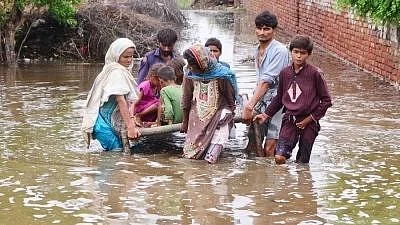Pakistan floods have caused an upsurge of attention and concern worldwide. These floods have been record-breaking with over one-third of Pakistan under water. With incredible damage done to human lives, the situation was so dire, the government declared National Emergency on 25 August.
Recently, a study was conducted by the World Weather Attribution on whether and to what extent human-caused climate change altered the likelihood and intensity of this extreme rainfall. Experts from nine different countries participated in this study.
Current Climate Models Fail To Simulate Monsoon in Indus River Basin
The researchers hoped to analyse two aspects of this event – the 60-day period of heaviest rainfall over the Indus river basin between June and September, and the 5-day period of heaviest rainfall in Sindh and Balochistan.
During the study, the experts concluded that current climate models failed to accurately simulate monsoon rainfall in the Indus river basin.
This was because the regions along the western edge received a varied pattern of rainfall from year to year.
"Monsoon rainfall in the Indus basin is highly variable from year to year. This is partly because the region is located near the western edge of the monsoon area, where the effects of the monsoon are not always evident. But also because rainfall in this region is strongly influenced by large-scale events such as La Niña. This makes it difficult for climate models to accurately simulate the rainy season there, which has been a major challenge in this analysis," said Sjoukje Philip, a Researcher at the Royal Netherlands Meteorological Institute (KNMI).
Further, it was hard to quantify the influence of climate change as accurately as done in other extreme weather event studies such as heatwaves and heavy rainfall in areas with less variability and more reliable models.
“Our evidence suggests that climate change played an important role in the event, although our analysis doesn’t allow us to quantify how big the role was. This is because it is a region with very different weather from one year to another, which makes it hard to see long-term changes in observed data and climate models. This means the mathematical uncertainty is large."Friederike Otto, Senior Lecturer in Climate Science, Grantham Institute
Impact of the Floods Was Increased Due to Close Proximity of Human Settlements
According to the study, the flooding was a direct consequence of the continuous monsoon rainfall that occurred during the summer, along with the shorter spikes of heavy rainfall in August, particularly in the areas of Balochistan and Sindh.
The impacts of the flooding were particularly devastating because of the close proximity of the residential settlements, infrastructure and agricultural land.
“Reducing the vulnerability of the population is critical to prevent extreme weather events from becoming humanitarian disasters. The rainfall was very extreme, but there are many measures that can prevent such massive damages in the future. Implementing early warning systems that reach the local level, enforcing flood zones, and improving river management systems can make the next flood less deadly,” according to Maarten van Aalst, the Director at the Red Cross Red Crescent Climate Centre.
It was especially affected by the lack of preparation in anti-risk reduction, inadequate infrastructure and an outdated river management system. Added factors were the high poverty rates and political and economic instability.
On a better note, the study has concluded that the probability of an event like this recurring is one in hundred years, however, considering how varied rainfall in the Indus river basin is, with the added instability of climate change, it's hard to be certain.
"Pakistan suffered from historic levels of rainfall and it is arguable whether any country, anywhere, could be completely prepared for this type and scale of hazard. At the same time, looking at this disaster as a product of historically rooted processes of vulnerability and inequality – of power and knowledge – in the Indus Basin, rather than as the outcome of a single weather event, is critical for a complete understanding."Ayesha Siddiqi, Assistant Professor at the Department of Geography, University of Cambridge.
Global Temperature Rise Played a Role in the Floods
The five-day maximum rainfall over the provinces of Sindh and Balochistan is now 75 percent heavier and more intense than it used be pre-industrial revolution temperatures.
The 60-day rainfall in the region is now approximately 50% more intense. This means that the likelihood of rainfall this heavy could become a common occurrence. According to the study, the increased rainfall is due to the 1.2 degree increase in global temperature.
However, because of the variability in the region, it is still hard to certain.
“Fingerprints of climate change in exacerbating the heatwave earlier this year, and now the flooding, provide conclusive evidence of Pakistan’s vulnerability to such extremes.Fahad Saeed, Researcher at the Center for Climate Change and Sustainable Development, Islamabad, Pakistan.
To understand the changes that could be observed due to human induced climate change, the study also considers previous trends in climate models, with and excluding green house gas emissions. However, many of these carefully selected climate models showed smaller changes in the possibility of and intensity of extreme rainfall.
This sets a precedent for the future, especially with the global temperature threshold set at 2 degree Celsius, climate models suggest will increase significantly.
